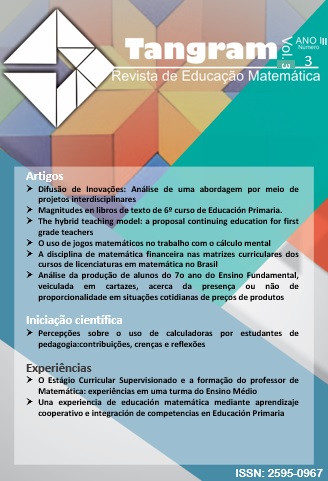The hybrid teaching model: a proposal continuing education for first grade teachers
DOI:
https://doi.org/10.30612/tangram.v3i3.12742Keywords:
Teacher training pedagogues. Inverted Classroom. GeoGebra.Abstract
This paper presents part of the results of a project that aimed to investigate whether strategies used for continuing education of first grade teachers, using a Hybrid Teaching model,“Flipped Classroom” could be a favorable instrument for the continued training of elementary school teachers in the context of Mathematics (Shulman,1987), in particular Geometry. The proposal was an attempt to seek the improvement of didactic concepts and practices for the teaching of Geometry in the early years of basic school, addressing theoretical (Van Hiele,1986) and methodological aspects and with the use of digital technologies, especially GeoGebra software. A training was offered with the proposal of empowering educators, who teach in elementary school, to teach Plane Geometry with the use of digital technologies and encourage them in the continuous search for professional improvement. The teachers participated forcreating the proposed model, offering their respective areas of expertise, and contributing to significant results.Downloads
References
Collins, A. Joseph, D, Bielaczyc, K. (2004). Design Research: Theoretical and Methodological Issues. Journal of the Learning Sciences. Evanston, p.13-42
Doerr, H. M.; Wood, T. (2006). Pesquisa-Projeto (design research): aprendendo a ensinar Matemática. In: BORBA, M.C. Tendências internacionais em formação de professores de Matemática. Belo Horizonte: Autêntica, Cap.5, p.113-128.
Kenski, V. (2008). Educação e Tecnologias - O novo ritmo da informação. São Paulo, Ed. Papirus,
Koehler, M. J.; Mishra, P.; Yahya K. (2007). Tracing the development of teacher knowledge in a design seminar: Integrating content, pedagogy and technology. Computers & Education, v.49, p. 740-762.
Mishra, P. e Koehler, M. J. (2006). Technological Pedagogical Content Knowledge: A Framework for Teacher Knowledge. Teachers College Record, v. 108, n.6, p. 1017-1054.
Perrenoud, P. (1999). Avaliação da Excelência à Regulação das Aprendizagens. Porto Alegra: Editora Artmed.
Shulman, L. S. (1987). Knowledge and teaching: foundations of the new reform. Harvard Educational Review, v. 57, n. 1, p. 1-22.
Van Hiele, P. (1986). Structure and insight: a theory of mathematics educacion. Orlando: AcademicPress,
Downloads
Published
How to Cite
Issue
Section
License
Authors must accept the publication rules when submitting the journal, as well as agree to the following terms:
(a) The Editorial Board reserves the right to make changes to the Portuguese language in the originals to maintain the cultured standard of the language, while respecting the style of the authors.
(b) Authors retain the copyright and grant the journal the right to first publication, with the work simultaneously licensed under the Attribution-NonCommercial-ShareAlike 3.0 Brazil (CC BY-NC-SA 3.0 BR) that allows: Share - copy and redistribute the material in any medium or format and Adapt - remix, transform, and create from the material. CC BY-NC-SA 3.0 BR considers the following terms:
- Attribution - You must give the appropriate credit, provide a link to the license and indicate whether changes have been made. You must do so under any reasonable circumstances, but in no way that would suggest that the licensor supports you or your use.
- NonCommercial - You may not use the material for commercial purposes.
- Sharing - If you remix, transform, or create from material, you must distribute your contributions under the same license as the original.
- No additional restrictions - You may not apply legal terms or technological measures that legally restrict others from doing anything that the license permits.
(c) After publication, authors are allowed and encouraged to publish and distribute their work online - in institutional repositories, personal page, social network or other scientific dissemination sites, as long as the publication is not for commercial purposes.






